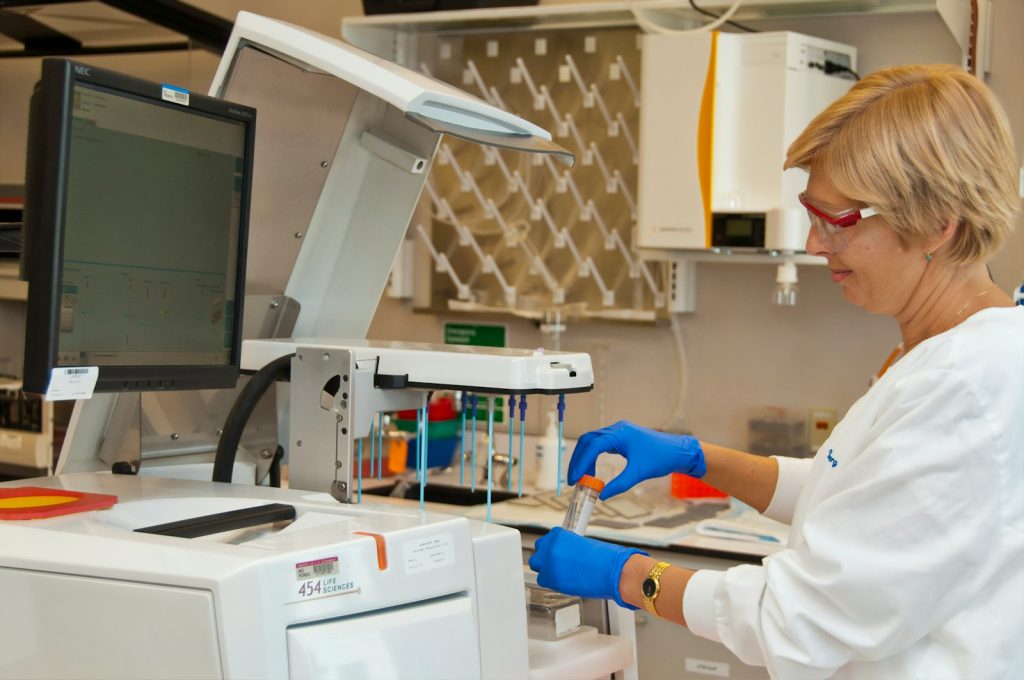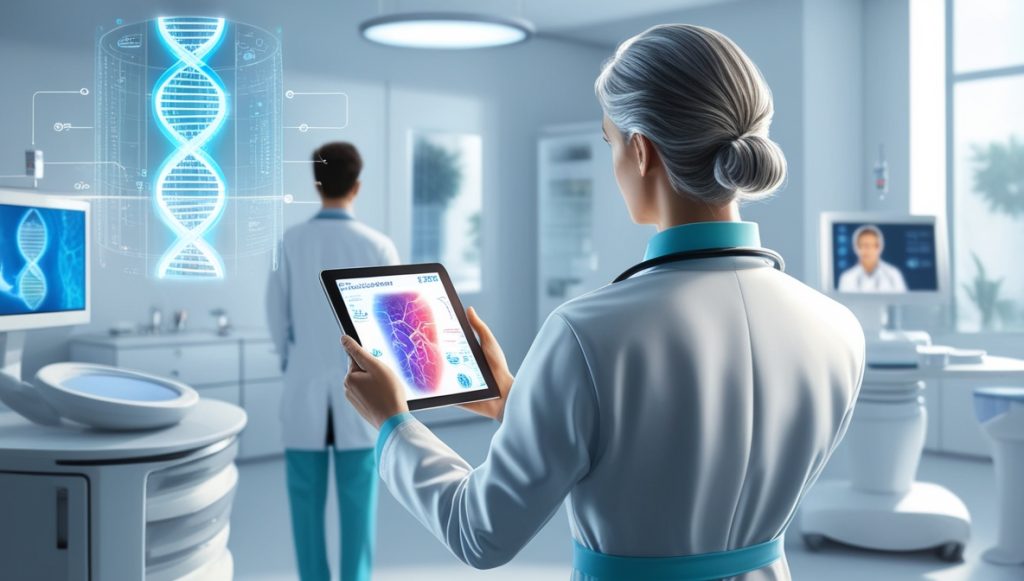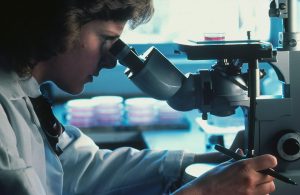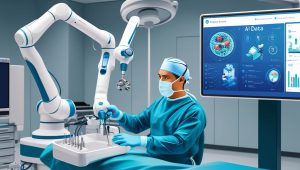
Imagine a world where your treatment is as unique as your DNA. A world where healthcare doesn’t rely on a one-size-fits-all approach but instead provides you with therapies designed specifically for you. This isn’t science fiction. It’s the reality we’re approaching with precision medicine. But what exactly is precision medicine, and how does it harness technology to provide tailored treatments? Let’s dive in!
Table of contents
- What is Precision Medicine?
- Why Precision Medicine Matters Right Now
- The Technology Behind Precision Medicine
- How Precision Medicine Solves Real-World Problems
- The Benefits of Precision Medicine
- Challenges and the Future of Precision Medicine
- How You Can Benefit From Precision Medicine
- Conclusion: The Future is Personal
- Q&A
What is Precision Medicine?
Precision medicine is all about providing the right treatment for the right person at the right time. Unlike traditional medicine, which often treats patients using generalized approaches, precision medicine takes into account an individual’s genetic makeup, environment, and lifestyle. The goal? To create more effective and personalized care.
It’s an exciting shift in the way we approach healthcare, one driven by cutting-edge technologies that analyze vast amounts of data to deliver personalized treatments.

Why Precision Medicine Matters Right Now
We’re living in an era where our ability to gather and analyze data is better than ever before. But why is this relevant to you? Think about it: every year, millions of patients receive treatments that might not be the most effective for their specific condition. Standard treatments can sometimes be hit-or-miss, leading to trial-and-error prescribing, wasted resources, and even side effects.
The challenge with traditional medicine is that it’s designed for the “average” patient. However, there’s no such thing as an average patient, right? We all have different genetic backgrounds, lifestyles, and even environmental exposures. Precision medicine addresses this gap, offering solutions that are customized to each individual’s unique needs.
The Technology Behind Precision Medicine
So, how does technology enable precision medicine? Several groundbreaking advancements are making this approach possible:
1. Genomic Sequencing
One of the most significant drivers of precision medicine is genomic sequencing. By analyzing a patient’s DNA, doctors can pinpoint genetic variations that may affect how a person responds to certain medications or treatments.
Imagine you have cancer, and instead of trying multiple rounds of chemotherapy, doctors can analyze your tumor’s genetic mutations and choose a drug that targets your specific cancer cells. It’s incredibly precise and minimizes harm to the rest of your body.

2. Big Data and Artificial Intelligence
Big data and AI are the backbone of precision medicine. The healthcare industry generates an immense amount of data—everything from patient records to imaging results. AI can analyze this data much faster and more accurately than humans, uncovering trends and making predictions that were previously impossible.
For example, AI might predict how you will respond to a certain drug based on your genetic makeup and medical history. It can help tailor treatments to avoid adverse reactions and improve outcomes. AI doesn’t just stop at the data crunching; it also helps in diagnostics, drug discovery, and even surgery planning.
3. Personalized Drug Development
Traditional drug development is a lengthy and costly process. But with precision medicine, pharmaceutical companies are now exploring targeted therapies that work for specific patient populations. This approach accelerates the process and ensures that the treatments are more effective for the individuals they’re designed for.
We’re already seeing this in cancer treatments, where drugs like Herceptin are tailored for people with specific breast cancer gene mutations. This reduces the guesswork in treatment and improves success rates dramatically.
How Precision Medicine Solves Real-World Problems
Precision medicine isn’t just a theoretical concept; it’s already making a difference in people’s lives. Let’s look at some of the real-world problems it’s solving.
1. Reducing Trial-and-Error Treatments
Have you ever had to switch medications several times to find the one that works best for you? It’s frustrating, time-consuming, and sometimes even harmful. With precision medicine, doctors can use your genetic information to predict how you’ll respond to different drugs, significantly reducing the need for trial and error.
2. Preventing Adverse Drug Reactions
Not all medications work the same for everyone, and in some cases, drugs can cause severe side effects. Precision medicine identifies these risks early by analyzing a patient’s genetic profile and predicting whether certain medications might cause adverse reactions. This helps to avoid potentially harmful situations.
3. Targeting Disease at the Source
Precision medicine is especially promising in fields like oncology and cardiology. In cancer, treatments can now target specific genetic mutations in tumors, stopping the disease in its tracks more effectively than traditional therapies. Similarly, in heart disease, genetic insights can guide doctors in offering treatments that are tailored to prevent heart attacks or strokes based on individual risk factors.
The Benefits of Precision Medicine
So, why should you care about precision medicine? There are a few standout reasons why this approach could revolutionize healthcare as we know it:
- Improved Outcomes: By customizing treatment plans to each patient’s specific genetic makeup, doctors can often achieve better results in less time.
- Fewer Side Effects: Tailored therapies mean fewer adverse reactions and a better overall experience for the patient.
- Cost-Effective: Although precision medicine can seem costly upfront, it often leads to savings by reducing unnecessary treatments and hospitalizations.
- Preventative Power: Beyond treating diseases, precision medicine can also be used to predict future health risks. This allows for earlier interventions, potentially preventing serious conditions before they develop.

Challenges and the Future of Precision Medicine
Of course, with any innovative technology, there are challenges to consider. Precision medicine requires access to vast amounts of patient data, which brings up concerns about privacy and data security. There’s also the cost factor. Genomic sequencing, while more affordable than before, is still out of reach for many patients.
However, as technology advances and becomes more accessible, these barriers are likely to diminish. The future of precision medicine looks bright, with ongoing developments in AI, genomics, and medical data science continuing to push the boundaries of personalized healthcare.
How You Can Benefit From Precision Medicine
You might be wondering, How can I take advantage of precision medicine? The good news is that the approach is becoming more widely available. If you have a chronic condition or are undergoing treatment for a disease like cancer, talk to your healthcare provider about whether precision medicine could benefit you.
Many hospitals and medical centers are now incorporating genomic testing into their standard care. Additionally, you can stay informed by reading up on the latest in healthcare technology and looking out for clinical trials that focus on precision medicine.
Conclusion: The Future is Personal
In the world of healthcare, one size does not fit all. Precision medicine offers a glimpse into a future where treatments are tailored to individuals rather than diseases. It’s a future where you can receive personalized, effective care based on your unique genetic makeup and lifestyle.
As technology continues to evolve, precision medicine will likely become the gold standard in healthcare. From AI-powered diagnostics to genomics-driven therapies, the tools to provide customized care are already here—and they’re only getting better. So, the next time you think about your health, remember: the future is personal.
Q&A
What is precision medicine?
Precision medicine is a healthcare approach that tailors treatments and therapies to individuals based on their genetic, environmental, and lifestyle factors. It aims to provide the most effective care by considering what makes each patient unique.
How does precision medicine work?
Precision medicine works by using advanced technologies like genomic sequencing, big data, and AI to analyze a patient’s genetic profile, medical history, and other personal information. This data is then used to design customized treatment plans.
What are the benefits of precision medicine?
Precision medicine offers several benefits, including improved treatment outcomes, fewer side effects, cost-effectiveness, and the ability to predict and prevent diseases based on a person’s genetic makeup.
Is precision medicine available to everyone?
While precision medicine is becoming more widely available, it is still relatively new and can be costly. However, as technology continues to advance, it is expected that precision medicine will become more accessible to a larger population.
How can AI help in precision medicine?
AI plays a crucial role in precision medicine by analyzing large amounts of medical data quickly and accurately. It helps in identifying patterns, predicting patient outcomes, and personalizing treatments based on individual characteristics.
Further Reading on Precision Medicine and Technology
National Institutes of Health (NIH) – Precision Medicine Initiative
Learn more about the Precision Medicine Initiative launched by NIH, aiming to revolutionize how we improve health and treat disease.
NIH Precision Medicine Initiative
Mayo Clinic – Precision Medicine: A Revolution in the Making
This article from the Mayo Clinic explains how precision medicine is changing the landscape of healthcare with personalized treatments.
Mayo Clinic Precision Medicine Overview
World Economic Forum – The Future of Precision Medicine
This article discusses the potential of precision medicine to transform global healthcare.
WEF on Precision Medicine



